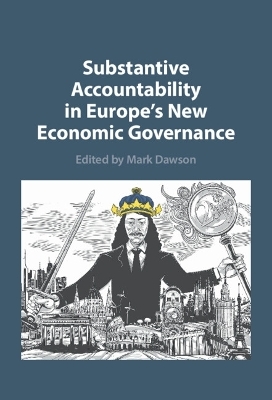
Substantive Accountability in Europe's New Economic Governance
Cambridge University Press (Verlag)
978-1-009-22883-1 (ISBN)
The EU has become an increasingly powerful economic actor but we lack research on how EU economic decision-makers can be held to account. This book argues that the EU suffers from important substantive accountability deficits I.e. while numerous procedures exist to hold institutions like the Commission and ECB to account, there are few mechanisms to contest the merit and impact of economic decisions. The book combines detailed empirical research on how accountability practices are evolving across different fields of EU economic governance with a novel conceptual framework to assess where accountability deficits lie and how they might be addressed. Combining leading research in law and political science, this book will be of interest to scholars with an interest in the questions of accountability and economic governance arising from the budgets, central banks and financial institutions of the European Union. This title is Open Access.
Mark Dawson is currently the co-editor of the series Cambridge Studies in European Law and Policy and a member of the Editorial Board of the European Law Review. He has published two monographs and a textbook with Cambridge University Press as well as articles in leading journals in law and political science, such as the MLR, OJLS, JEPP, JCMS and CMLRev.
Introduction: The accountability impasse of the EU's new economic governance; Mark Dawson; Part I. (Re)theorising Accountability in EMU: 1. From Procedural to Substantive Accountability in EMU Governance; Adina Akbik and Mark Dawson; 2. Reconsidering the good of improving accountability; Roy L. Heidelberg; 3. Markets as an accountability mechanism in EU economic governance; Armin Steinbach; 4. The case for intra-executive accountability in the banking union; Matthias Goldmann; Part II. Political Accountability: 5. Democratic accountability in the banking union: is there really a gap?; Diane Fromage; 6. The political and legal accountability of the Eurogroup; Menelaos Markakis; 7. The economic dialogues with the Eurogroup: substantive accountability claimed, but unmet; Adina Akbik; 8. Parliamentary accountability of the country specific recommendations: effectiveness and substance; Tomasz P. Wozniakowski; Part III. Legal Accountability: 9. Constructive constitutional conflict as an accountability device in monetary policy; Ana Bobić; 10. Adjudicating transnational solidarity conflicts: can courts ban the destructive potential?; Anuscheh Farahat; 11. Judicial accountability of financial assistance in the case of Eurozone debtor countries; Teresa Violante; 12. Human rights accountability in European financial assistance; Anastasia Poulou; 13. Constitutive powers and justification: the duty to give reasons in EU monetary policy; Joana Mendes; Index.
| Erscheinungsdatum | 28.11.2023 |
|---|---|
| Zusatzinfo | Worked examples or Exercises; 4 Line drawings, black and white |
| Verlagsort | Cambridge |
| Sprache | englisch |
| Maße | 155 x 235 mm |
| Gewicht | 607 g |
| Themenwelt | Recht / Steuern ► EU / Internationales Recht |
| Recht / Steuern ► Wirtschaftsrecht ► Bank- und Kapitalmarktrecht | |
| Wirtschaft ► Betriebswirtschaft / Management ► Finanzierung | |
| Betriebswirtschaft / Management ► Spezielle Betriebswirtschaftslehre ► Bankbetriebslehre | |
| Wirtschaft ► Volkswirtschaftslehre ► Finanzwissenschaft | |
| ISBN-10 | 1-009-22883-8 / 1009228838 |
| ISBN-13 | 978-1-009-22883-1 / 9781009228831 |
| Zustand | Neuware |
| Informationen gemäß Produktsicherheitsverordnung (GPSR) | |
| Haben Sie eine Frage zum Produkt? |
aus dem Bereich


